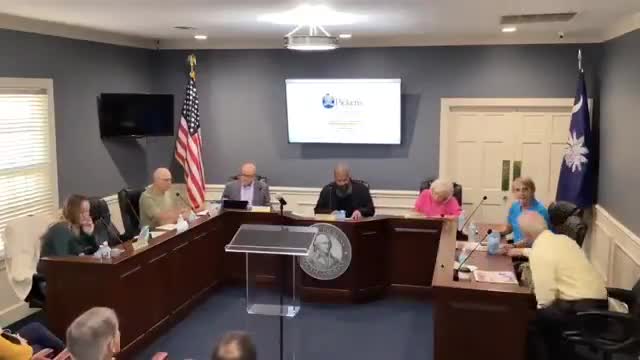State housing trust fund officials brief Pickens on home-repair, disaster aid and builder incentives
Get AI-powered insights, summaries, and transcripts
Subscribe
Summary
Representatives from the South Carolina Housing Authority outlined the Housing Trust Fund—s single-family home-repair and disaster-assistance programs, eligibility rules and a new workforce "Made at Home" builder incentive. They urged Pickens officials to consider acting as a local sponsor to expand access to repairs and set aside disaster funds.
Representatives of the South Carolina Housing Authority and the State Housing Trust Fund on Tuesday described grant programs they said could help Pickens homeowners with repairs, accessibility modifications and disaster recovery, and outlined a separate workforce-housing incentive for builders.
The state—s Housing Trust Fund supports four programs, said Jack Suber, manager of the South Carolina Housing Trust Fund: a home-repair program, a critical home-repair tier, a disaster-assistance program and a supportive-housing program. Robert McDonald, chief of staff at the South Carolina Housing Authority, said the fund receives a portion of documentary stamp taxes and distributes that money through local sponsors, nonprofit developers and local governments.
Suber and McDonald said homeowners must own the property to be eligible and must meet HUD-based low- and moderate-income thresholds (about 80% of area median income). The critical-repair tier is capped at $30,000 per home and is intended for single-contractor projects such as a roof or HVAC replacement; the higher-level home-repair award can cover up to $75,000. Manufactured-home repairs can reach $40,000 under some rules.
The fund requires income verification of all household members 18 and older, Suber said, and typically records a restrictive land-use covenant on awards above $15,000. Suber described that covenant as a 20-year, forgivable restrictive covenant that proratates repayment if a property is sold during the restricted term. He said sponsors receive a 15% developer fee on each assisted home to cover administration and project management.
Suber and McDonald said the trust fund has adjusted eligibility to allow accessibility modifications such as ramps and widened doorways and said the program can be used when federal relief is not available. The Authority has set aside nearly $10 million for disaster assistance and the board later approved another $10 million in reserve for future disasters; Suber said local governments can apply whether or not an event is federally declared.
Panelists identified implementation hurdles: small local nonprofit sponsors often lack capacity to manage grants and inspections, contractors may be unavailable for rural work, and older homes (pre-1978) bring lead-based-paint requirements that some small sponsors avoid because of extra steps and cost. Suber said the Housing Trust Fund is expanding outreach to local governments, which typically have grant experience, building officials and inspection capacity.
Thomas Alexander, identified in the session as chairman of the housing authority, and Robert McDonald also described "Made at Home," a separate workforce-housing initiative that pairs financing and incentives to lower the cost of new single-family homes. The program offers builder incentives and down-payment assistance to buyers: the authority has set a model price point of roughly $175,000 for a 1,000-square-foot house and described a per-unit builder bonus (reported in the presentation as about $12,500) plus a down-payment assistance forgivable loan to buyers (described as $25,000). The housing authority said it will finance homes through its bond-backed lending to achieve lower interest than many commercial mortgages.
Alexander said the initial rollout received limited builder response but that several respondents to the agency—s request for proposals were selected and that award notifications are imminent. He also described local partnerships where municipalities contribute land, waive tap and sewer fees, or offer infrastructure support to improve project feasibility.
Why it matters: the trust fund programs would let Pickens expand single-family home repairs, address unmet disaster needs in non-federally declared areas and, through the Made at Home program, aim to increase small, lower-cost single-family production for workforce households. Council members asked about inspection responsibility, the covenant—s payoff formula on sale, and how the authority handles lead-based-paint and manufactured-home eligibility.
Council follow-up/directions: presenters said the city can apply to be a sponsor using an abbreviated application, will receive training from agency staff, and should expect to perform income verification and initial inspections or coordinate with local certified inspectors. Agency staff said they will share the application and the PowerPoint presentation with city staff and follow up on potential local partnerships.
Ending: presenters encouraged Pickens officials to consider sponsorship to increase local capacity for repairs and to monitor upcoming Made at Home awards for local builder participation. The city expressed interest in receiving application materials and a PDF of the presentation.
